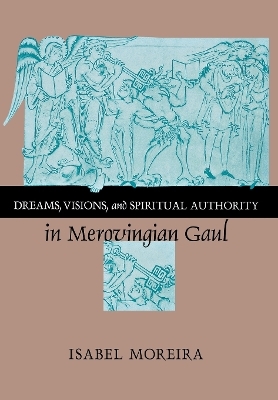
Dreams, Visions, and Spiritual Authority in Merovingian Gaul
Seiten
2000
Cornell University Press (Verlag)
978-0-8014-3661-1 (ISBN)
Cornell University Press (Verlag)
978-0-8014-3661-1 (ISBN)
- Lieferbar (Termin unbekannt)
- Versandkostenfrei
- Auch auf Rechnung
- Artikel merken
In early medieval Europe, dreams and visions were believed to reveal divine information about Christian life and the hereafter. No consensus existed, however, as to whether all Christians, or only a spiritual elite, were entitled to have a...
In early medieval Europe, dreams and visions were believed to reveal divine information about Christian life and the hereafter. No consensus existed, however, as to whether all Christians, or only a spiritual elite, were entitled to have a relationship of this sort with the supernatural. Drawing on a rich variety of sources—histories, hagiographies, ascetic literature, and records of dreams at saints' shrines—Isabel Moreira provides insight into a society struggling to understand and negotiate its religious visions.
Moreira analyzes changing attitudes toward dreams and visionary experiences beginning in late antiquity, when the church hierarchy considered lay dreamers a threat to its claims of spiritual authority. Moreira describes how, over the course of the Merovingian period, the clergy came to accept the visions of ordinary folk—peasants, women, and children—as authentic.
Dream literature and accounts of visionary experiences infiltrated all aspects of medieval culture by the eighth century, and the dreams of ordinary Christians became central to the clergy's pastoral concerns. Written in clear and inviting prose, this book enables readers to understand how the clerics of Merovingian Gaul allowed a Christian culture of dreaming to develop and flourish without compromising the religious orthodoxy of the community or the primacy of their own authority.
In early medieval Europe, dreams and visions were believed to reveal divine information about Christian life and the hereafter. No consensus existed, however, as to whether all Christians, or only a spiritual elite, were entitled to have a relationship of this sort with the supernatural. Drawing on a rich variety of sources—histories, hagiographies, ascetic literature, and records of dreams at saints' shrines—Isabel Moreira provides insight into a society struggling to understand and negotiate its religious visions.
Moreira analyzes changing attitudes toward dreams and visionary experiences beginning in late antiquity, when the church hierarchy considered lay dreamers a threat to its claims of spiritual authority. Moreira describes how, over the course of the Merovingian period, the clergy came to accept the visions of ordinary folk—peasants, women, and children—as authentic.
Dream literature and accounts of visionary experiences infiltrated all aspects of medieval culture by the eighth century, and the dreams of ordinary Christians became central to the clergy's pastoral concerns. Written in clear and inviting prose, this book enables readers to understand how the clerics of Merovingian Gaul allowed a Christian culture of dreaming to develop and flourish without compromising the religious orthodoxy of the community or the primacy of their own authority.
Isabel Moreira is Associate Professor of History at the University of Utah.
| Erscheint lt. Verlag | 29.6.2000 |
|---|---|
| Verlagsort | Ithaca |
| Sprache | englisch |
| Maße | 155 x 235 mm |
| Gewicht | 907 g |
| Themenwelt | Geschichte ► Allgemeine Geschichte ► Mittelalter |
| Geisteswissenschaften ► Geschichte ► Regional- / Ländergeschichte | |
| Geschichte ► Teilgebiete der Geschichte ► Religionsgeschichte | |
| Geisteswissenschaften ► Religion / Theologie | |
| ISBN-10 | 0-8014-3661-3 / 0801436613 |
| ISBN-13 | 978-0-8014-3661-1 / 9780801436611 |
| Zustand | Neuware |
| Haben Sie eine Frage zum Produkt? |
Mehr entdecken
aus dem Bereich
aus dem Bereich
eine neue Geschichte des Mittelalters
Buch | Hardcover (2023)
C.H.Beck (Verlag)
CHF 53,20


